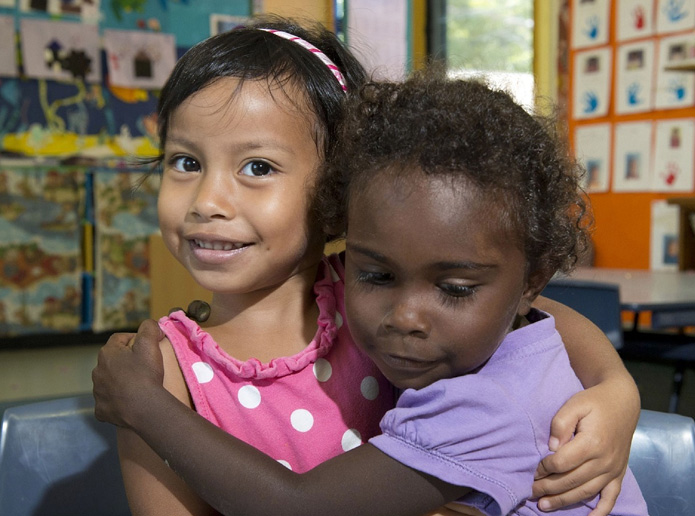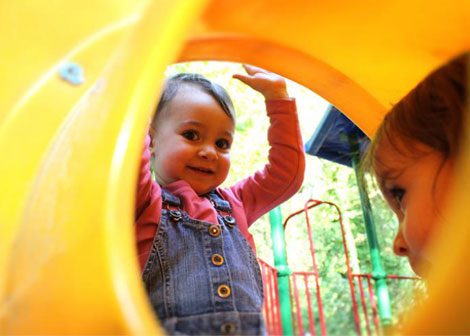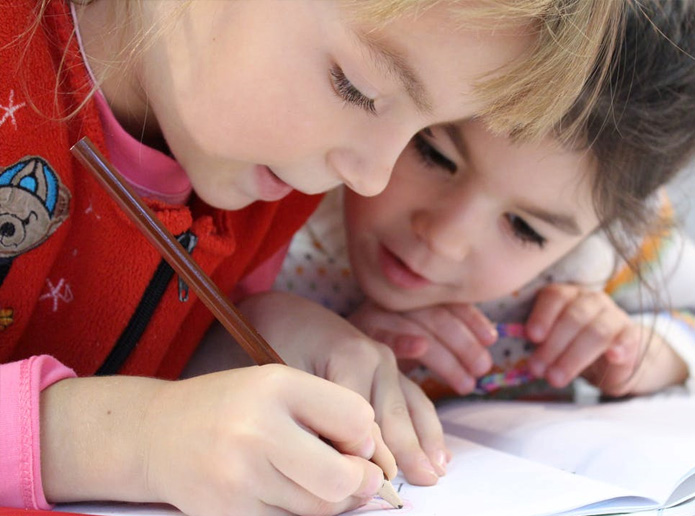Starting school can be a very exciting time for you and your child. It is a big change for the family and everyone reacts differently.
It’s normal to feel worried or sad, but important to encourage being excited and positive too.
The transition to school needs to start well before the first day and continues during the early days, weeks and even months.
Getting to school
The journey to school can be long, short, in the car, by foot or bicycle – this in itself is a transition. Some children will get tearful or fearful, others so excited they are ready hours before!
To help prepare your child for this transition, spend some days prior to the start of term having a dry run of this journey. Talk along the way about the places you pass, road safety and crossings and who will pick them up and when.
Talk about what you will be doing when they are at school and what is planned on the way home, like a trip to the shops or park and what is for tea. This will give them something to focus on if they are nervous and anxious about what is happening next.
After a few trips along the route, the first day at school will feel more familiar when they are used to how they get there.
The practical stuff
Dressing and undressing
Kindy and pre-primary teachers spend a lot of time helping children with clothing and footwear! Has your child practiced getting dressed and undressed? Putting shoes on and off – zipping up bags and tying their hats? All these things we often do to ‘hurry’ them up but when they are on their own these skills may not be practised enough for them to do by themselves.
Dress your child for success, ensuring pants are easy to pull up and down and don’t have difficult zips and buttons. It would be worth doing some practice days of wearing the school uniform to iron out any issues – and label everything!
Toileting
It can be off-putting or scary for a child to use unfamiliar toilets. They are going to be different from ones at home: low seats, low doors, different toilet paper and noisy if someone is in the next cubicle.
Some children will hold on until they get home – or worse hold on until it is too late. If possible, make sure your child has used the school toilet facilities before they start, so they are used to them.
Meal times and snacks
The school day is broken up by break time and lunch time. Find out when these times are so that you can practice at home with your pre-schooler to have morning tea and lunch at the same times and help them open and close their lunch box. Get to know which foods are going to travel well and sit in the classroom.
Common issues
- Too much food being sent in the lunch box or unable to finish it all in time.
- The food needs a spoon to eat it and it’s not in the lunchbox.
- Children find it hard to open the packaging or their drink bottle and has to wait for a teacher to help them.
- The food goes soggy or gets hot and unappetising by lunchtime.
- Children might lose their appetite when embarking on a new experience like starting school, so they may not eat at all during the day.
- Children find the ‘sweet treat’ the most attractive thing in the lunch box and fail to eat the rest! If that happens every day, save the treat for after school.
Helpful tips and suggestions
- Make time in the morning routine for a good breakfast, such as egg on toast, or porridge and fruit. If time is tight, make a smoothie with blended milk and wheat biscuits; sneak in some fruit, like banana, if you can.
- Prepare the lunch box the night before. If possible, encourage your child to help you so they know what’s in there.
- Sandwiches are the norm but may become soggy and fall apart by lunch. Try putting an assortment of items in a compartment box (a small tackle box is good), things like cooked pasta, grapes, cheese cubes, cherry tomatoes, or olives. Children often like food that is not all mixed together so they can see what they are eating.
- If your child is overwhelmed with the new routine and lose their appetite at school, but are hungry afterwards, have a healthy snack box in the car or for the walk home to keep them going.
- This may already be your pattern, but you may need to move dinner time forward to 4.30pm or 5.00pm to accommodate hungry children.
New routines
Even if your child has been to an early learning service (childcare), do not assume that the transition to school will be easy for them. More independence will be expected of them, there will be more ‘rules’ to remember, the teacher to child ratio is different, and the environment is all new.
A good, predictable morning routine will help your child to predict the day, recall what they need to do and sets the day off to strong positive start.
Being prepared and taking into account new routines for meal times and bed times is an important step to managing a smooth transition.
Changes in behaviour
It is normal for behaviour to change during this time of transition. Even as parents, we are adjusting to our child moving to a new milestone – we might feel more anxious than them! However, if parents show their own anxiety and worry, it can rub off onto the child and make them feel more panicked.
When children are worried or anxious they sometimes act out by a change in behaviour rather than verbally explaining how they feel. Angry outbursts, going backwards with skills you thought they had mastered, or sleep disturbance are all common ways children express hesitancy or anxiety about change in their life.
Think back to other circumstances, like a new baby coming into the family, loss of a pet, or moving house. Your child may have specific coping strategies, which may not include telling you verbally what is worrying them.
Talking about school
Talk regularly to your child about school, though perhaps not straight after school when they are likely to be tired or hungry. When you are aware of your child’s feelings it will help you to spot problems before they get too big.
Try asking to ask specific or open questions that encourage more than a “yes” or “no” answer. They might start with ‘who’ , or ‘what’, rather than ‘did you’.
Sometimes parents are eager to hear about their child’s day and become frustrated when they ask “What did you do today?” or “How was your day?”, only to be given one word answers.
A way of starting a conversation might be to ask your child to tell you about the best thing and worst thing that happened to them in the day. This can be part of the dinner routine, with the whole family sharing their day’s best and worst things, and is a nice way to hear about your child’s day.
If you are concerned
Time and reassurance are often the keys, along with patience and trust that it will eventually work out.
If you feel your child is expressing concerns or having difficulties at school, arrange a time to talk with their teacher.
Want to know more?
Kidsmatter – Starting school: further resources
Raising Children Network – School age play and learning: school
Early Childhood Australia – First year at school resource
WA Department of Education – School life






